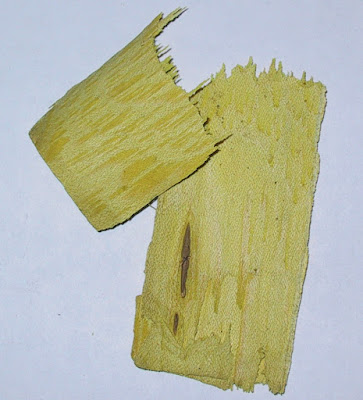 1. Extraction . . . . 'Cortex Phellodendri'
1. Extraction . . . . 'Cortex Phellodendri'  2. Production
2. ProductionThe Huang Bo strips are then transported to a GMP factory in Sichuan.
The crude herb is mixed with and left to soak in salt at a ratio of 2kg of salt per 100kg of Huang Bo. The crude mixture is yellowish and crisp with a bitter flavour.
After stir-frying over a soft heat, the cooked herb turns a darker colour with carbonized spots and retains its bitter flavour.
 3. Distribution
3. DistributionGSP's sell Huang Bo into hospitals, pharmacies and online.
It is difficult to find Huang Bo in its pure form, rather - it tends to be mixed with other herbs such as Angelica and Licorice then marketed as a skin purifier.
Average online price - around $20 per 100 pills.
 4. Consumption
4. Consumption
Salt cured Huang Bo
- drains damp heat from the lower jiao - thick-yellow leukorrhea, foul-smelling diarrhea, dysentery; damp-heat pouring downward or hot leg qi - red, swollen, painful knees, legs, and/or feet; damp-heat jaundice.
- drains Kidney fire with signs of yin deficiency such as steaming bone disorder, night sweats, afternoon fever and sweating, nocturnal emissions, spermatorrhea.
- drains fire and relieves toxicity - sores and lesions of the skin such as eczema.
In general TCM terms, processed Huang Bo tonifies Kidney yin and removes asthenic fever.
Medical thesaurus
- retain (v) - to keep
- purifier (n) - something that makes things pure
- leucorrhea (n) - a white/yellow discharge from the vagina
- dysentery (n) - an infection of the intestines causing severe diarrhea
- jaundice (n) - a yellow skin disease caused by excess bile in the blood
- deficiency (n) - when there is not enough of something
- steaming bone disorder (n) - a disease where heat bones are hot, yet skin remains dry
- nocturnal (adj.) - at night
- emission (n) - the flow of semen from the penis
- spermatorrhea (n) - an unintended emission
- relieve (v) - to take away
- lesion (n) - an area of damaged skin tissue
- eczema (n) - an itchy skin disease
- tonify (v) - to make stronger
- asthenic (adj.) - too weak
- sthenic (adj.) - too strong




 Water
Water






